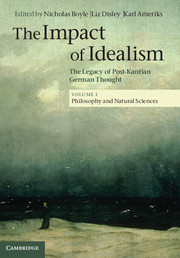Book contents
- Frontmatter
- Contents
- List of Illustrations
- List of Contributors
- Acknowledgements
- List of Abbreviations
- Foreword
- General introduction: the eighteenth and nineteenth centuries
- General introduction: the twentieth and twenty-first centuries
- Introduction: Idealism in the natural sciences and philosophy
- 1 Philosophy of natural science in Idealism and neo-Kantianism
- 2 The impact of German Idealism and Romanticism on biology in the nineteenth century
- 3 The unconscious: transcendental origins, Idealist metaphysics and psychoanalytic metapsychology
- 4 Nietzsche, Kant and teleology
- 5 Transcendental idealism, phenomenology and the metaphysics of intentionality
- 6 Heidegger and the impact of idealism
- 7 French Hegelianism and anti-Hegelianism in the 1960s: Hyppolite, Foucault and Deleuze
- 8 Scottish Idealism
- 9 ‘My station and its duties’: social-role accounts of obligation in Green and Bradley
- 10 Idealism and the origins of analytic philosophy1
- 11 Idealism and Pragmatism: the inheritance of Hegel's concept of experience
- 12 Reason's form
- Bibliography
- Index
- References
12 - Reason's form
Published online by Cambridge University Press: 05 December 2013
- Frontmatter
- Contents
- List of Illustrations
- List of Contributors
- Acknowledgements
- List of Abbreviations
- Foreword
- General introduction: the eighteenth and nineteenth centuries
- General introduction: the twentieth and twenty-first centuries
- Introduction: Idealism in the natural sciences and philosophy
- 1 Philosophy of natural science in Idealism and neo-Kantianism
- 2 The impact of German Idealism and Romanticism on biology in the nineteenth century
- 3 The unconscious: transcendental origins, Idealist metaphysics and psychoanalytic metapsychology
- 4 Nietzsche, Kant and teleology
- 5 Transcendental idealism, phenomenology and the metaphysics of intentionality
- 6 Heidegger and the impact of idealism
- 7 French Hegelianism and anti-Hegelianism in the 1960s: Hyppolite, Foucault and Deleuze
- 8 Scottish Idealism
- 9 ‘My station and its duties’: social-role accounts of obligation in Green and Bradley
- 10 Idealism and the origins of analytic philosophy1
- 11 Idealism and Pragmatism: the inheritance of Hegel's concept of experience
- 12 Reason's form
- Bibliography
- Index
- References
Summary
I
The question of freedom in the modern German tradition is not just a metaphysical question. It concerns the status of a free life as a value, indeed, as they took to saying, the ‘absolute’ value. A free life is of unconditional and incomparable and inestimable value, and it is the basis of the unique, and again, absolute, unqualifiable respect owed to any human person just as such. This certainly increases the pressure on anyone who espouses such a view to tell us what a free life consists in. Kant's famous answer is ‘autonomy’, where this means first or minimally freedom from external constraint, coercion and intimidation (‘thinking for yourself’), but even more importantly, being in a certain specific sort of self-relation. I can only be said truly to be ‘ruling myself’ when the considerations that determine what I do are reasons. But if, finally, in exercising reason I am merely rationally responsive to inclinations and desires and aversions, I am (according to Kant) still letting such contingent impulses ‘rule’ my life, however strategically rational or hierarchically ordered my plans for satisfaction turn out to be. So, Kant concludes, I am only truly autonomous, self-ruling, when the one consideration of importance (that is, normatively authoritative) in what I do is, as he says so frequently if still mysteriously, the ‘form of rationality’ as such. The more familiar name for such a necessary condition of autonomy is the Categorical Imperative. To make clear that this subjection to the ‘form’ of rationality counts as autonomy, Kant also insists that this moral law be understood as ‘self-legislated’, that we must be able to regard ourselves as its ‘author’, and that we are bound to such a law because we bind ourselves to it.
- Type
- Chapter
- Information
- The Impact of IdealismThe Legacy of Post-Kantian German Thought, pp. 373 - 394Publisher: Cambridge University PressPrint publication year: 2013
References
- 7
- Cited by

